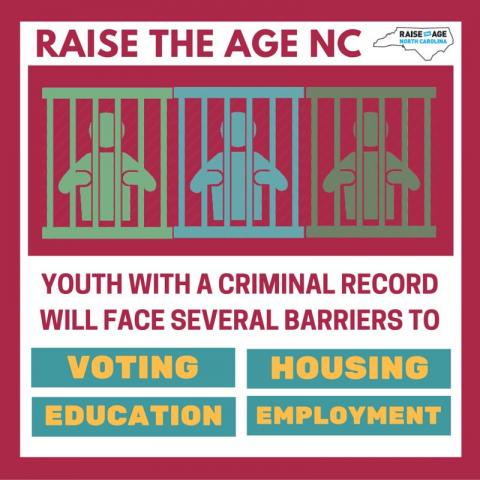
Recently, I addressed the NC Commission on the Administration of Law & Justice public hearing held in Wilmington, NC, advocating raising the age from 16 to 18 years old for prosecution under the adult justice system. There are only 2 states that prosecute 16- and 17-yr-olds as adults, North Carolina and New York. In 48 other states teenagers under the age of 18 are handled in the juvenile justice system. But in North Carolina if you are a day over 16 and break the law, you are tried as an adult and face the same punishment as any other lawbreaking adult. For many, this could mean spending time in an adult prison as a 16 year old.
Justin’s Story
It has been 21 years since my then 16-year-old son, Justin, broke the law. My speaking before the commission was a last minute decision as I had only read about the hearing in the morning newspaper. This hearing rekindled many buried emotions and re-opened the wound of that time so long ago; however for my son he cannot ever forget or remove the scar that is his for life. I felt I owed it to him to speak out. As a parent I should have done more for him but I relied on fairness and equitable treatment from the justice system. After all he was only a teenager. I now know that like many things in this world, the system is rigged. That sounds like sour grapes but it is true. There is a huge difference in parental justice and criminal justice.
Justin is developmentally disabled due to premature birth and lack of oxygen. He struggled in school and was in the exceptional children programs. He had limited social skills and adjustments were difficult. Physical development was fairly normal, so by appearances it would not be obvious of his impairments. He loved sports and video games like most boys. Then and today he is a great son and we talk endlessly about sports or his other favorite topic—politics. He has a big heart and is often taken advantage of because of it. So be it. In most senses, I would not want him to be different as he is better than most people I know but life for him is not easy.
At 16 and trying to fit in, like many teenagers, Justin associated with other teenagers that would not be good influences in his life. My son and this group of teenagers went on a spree of vandalizing cars on a fateful evening. When teenagers go on a spree like this it involves numerous break-ins. So the list is long. The police apparently fingered the ringleader who in turn implicated the others. My son was called into the office at school and was interviewed by the detective without a parent or other official present. “Tell the truth and it’ll go easier on you,” he is told.
Based on what was said, Justin was taken to the police station, booked, and placed in jail. I was notified and arranged bail. My son is always very truthful to a fault so he admitted to his participation which was largely an observer. He did not profit from this crime spree in any sense. As a parent I was angry at him. He knows right from wrong. My son was granted a public defender to represent him.
One Minute Justice
As we arrived at the courthouse the public defender met and talked with Justin for the first time, reviewed the charges and approached the district attorney. He returns with a plea arrangement to reduce charges from felony to misdemeanor. The threat of higher penalties if you force the hand of the system to prove their case is designed to provide “convenient” justice. What is the justice in not allowing my son’s story or witnesses to be heard, facts be presented, and the mitigating circumstances to temper the judgement? That is only on TV folks unless you can pay for a big time lawyer or one not afraid to challenge the system. It’s hard enough for an adult to navigate this system let alone a teenager. So that’s 30 seconds. Then when his case is called he got another 30 seconds as the judge pronounces sentence of probation and restitution. Another lawyer in the courtroom advised that our lawyer should have offered a diminished capacity defense. I never wanted to use his disability as an excuse. But hindsight is 20/20.
Years later we moved to Baltimore and Justin took a job as an usher with the Baltimore Orioles. He did well for many seasons culminating in being selected as Oriole’s Employee of the Month and recognized by an on field ceremony. Then, we moved back to North Carolina and my son took a job as a bagger at a local grocery store. He started working and everyone found him to be a good worker., until the corporate office did a background check and his record from the mistake he made as a juvenile came back. They immediately terminated him. The reason being that he falsified his application by omitting his convictions as a 16 year old. I had told him not to put this on his application as juvenile records are sealed, but I was wrong. In North Carolina the records are not sealed for any convictions over the age of 15.
This has haunted Justin ever since. If you put this on your job application it is difficult to convince an employer to take a chance on you in today’s competitive job market. So here we are 21 years later. He has not been in any legal trouble since that fateful night. He has collected a Social Security Disability Insurance benefit for his disability since he was 18, but would be happier working and being productive, because he is capable.
My Lesson
You love your child more than any system, fight like hell, and do not rely on 1 minute justice. But the real issue is we must raise the age for adult prosecution in the NC justice system to age 18. Sixteen is too young for a host of obvious reasons. We can certainly hold teenagers accountable, but we must give them redemption which is real justice that lasts a lifetime.



The views and opinions expressed in this post are those of the author(s) and do not necessarily reflect those of MomsRising.org.
MomsRising.org strongly encourages our readers to post comments in response to blog posts. We value diversity of opinions and perspectives. Our goals for this space are to be educational, thought-provoking, and respectful. So we actively moderate comments and we reserve the right to edit or remove comments that undermine these goals. Thanks!